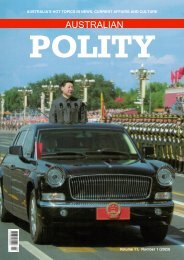Australian Polity, Volume 9 Number 3 - Digital Version
Australia's hot topics in news, current affairs and culture
Australia's hot topics in news, current affairs and culture
You also want an ePaper? Increase the reach of your titles
YUMPU automatically turns print PDFs into web optimized ePapers that Google loves.
Mike Pompeo, had persuaded President Trump to avoid
military confrontation, even if China attacked Taiwan.
Despite the sabre-rattling in Beijing, Xi risks major defeat
if he decides to turn his stealth war into a real military
conflict. Having been blamed for the botched Afghanistan
withdrawal, the mood in much of Washington is not about
further defeat and humiliation.
This article was first published in the Spectator Australia, September
4, 2021
The Uyghur Tribunal and Human Rights
An independent inquiry into the persecution of the
Uyghurs in the Chinese province of Xinjiang concluded
in London last week. The Uyghur Tribunal concluded eight
days of sittings, hearing from more than 70 witnesses
and reading from 500 witness statements. Chaired
by Sir Geoffrey Nice QC, who prosecuted Slobodan
Milosevic before the International Criminal Tribunal for
the former Yugoslavia, the Tribunal has compiled the
most extensive data base on the issue. It is due to hand
down its judgement in December.
The reaction from the Chinese Communist Party was
predictable. Sir Geoffrey, a prominent human rights
defender, was described absurdly by CCP officials as
a “notorious human rights abuser and a British spy.”
Nice is one of several leading critics of the Chinese
regime to have been sanctioned by the CCP, including
Parliamentarians, Sir Iain Duncan Smith and Lord David
Alton. IDS, as Smith is known, described the sanction as
a badge of honour.
Despite the bellicose rhetoric of the CCP, and its
assertions that the million people in concentration
camps are being educated voluntarily, it ignored multiple
invitations to present its case. Most damaging for the CCP
is the documentary evidence that links Xi Jinping directly
to the repression. Even if the camps were closed, China
has created a massive electronic surveillance network
across Xinjiang utilising facial and voice recognition,
monitoring every movement of people’s lives outside
their homes. Phone calls and text messages are recorded
by the State, as are downloads to mobile phones. The
contents are analysed using sophisticated algorithms.
Artificial intelligence and biometric data are used to track
the movements of 15 million people. People who switch
off their phones or leave them at home are tracked and
interrogated. Family members of diaspora groups who
criticise the regime from overseas are threatened, jailed
or paraded on State television to denounce their relatives.
Just as it is doing in Tibet and Inner Mongolia, the CCP
is enforcing a policy to eliminate the local language and
culture.
The conclusion of the Tribunal’s hearings comes at the
same time as Xi Jinping reiterated his assertion that
human rights are not universal. Foreign Minister Wang
Yi had previously told the UN Human Rights Council
that concepts of ‘peace, development, equity, justice,
democracy and freedom’ could not be universally
interpreted.
In an article in the People’s Daily on the “Study of
Xi Jinping’s Thoughts on Socialism with Chinese
Characteristics”, the President responded to the
question: “Why should we take a clear stand against the
so-called ‘universal values’ of the West?” The doctrinaire
Xi repudiated the values of freedom, democracy and
human rights, asserting they created an ideological
fog. Applying his strict Marxist-Leninist ideology, he
argued these values were instrumental in demolishing
feudal autocracy but are now just tools for maintaining
the rule of capital.
Tellingly, he worries about how these values were used
to dismantle the Soviet Union and employed in the Arab
Spring and how they could be used to overthrow the
CCP! No wonder other totalitarian regimes, including
most Islamic autocracies, have sided with China over
the treatment of its Muslim population. In 2019, the
Organisation for Islamic Cooperation, representing 57
member states, commended “the efforts of the People’s
Republic of China in providing care for its Muslim citizens.”
Statements by such well-known citadels of freedom
and democracy - Cuba and Belarus – to the UN General
Assembly in 2020 and the UN Human Rights Council in
2021, commending China’s actions were supported by
Islamic autocracies. The latter statement was breathlessly
reported in the CCP mouthpiece the Global Times as
evidence of “the truth about Xinjiang” as opposed to
Australian Polity 43





